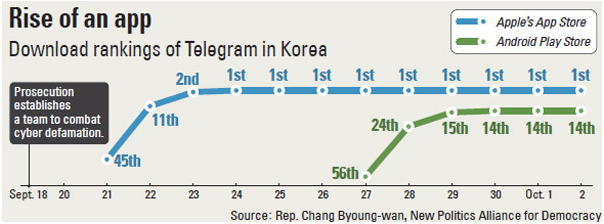Until a couple of weeks ago Koreans had never heard of Telegram, the super-secure Berlin-based messaging app that is now causing waves. Telegram is attracting droves of Korean users away, for increased security. In Korea, KakaoTalk is installed on 95% of smartphones, and Kakao messages surpassed SMS messages a few years back. Kakao is known for its ease of use and expressive emoticons.
But now Kakao, which has established a near-monopoly in Korea, is facing a serious challenger on its home turf - Telegram.
The Korea JoongAng Ilbo tells us where this all began.
"On Sept. 18, the Supreme Prosecutors’ Office established a new cyber investigation team, according to the office of New Politics Alliance for Democracy Rep. Chang Byoung-wan, who is also a member of the Science, ICT, Future Planning, Broadcasting and Communications Committee of the National Assembly. The purpose is to prevent cyber defamation and the spread of false information."
The idea sparked controversy and it later transpired that the chat records of the deputy head of the left-wing Labor Party, Jeong Jin-u, had been tapped by the authorities using a warrant.
That spooked people across Korea.
These frightened folks, especially those in sensitive positions, started looking for secure, encrypted alternatives. Telegram came up as the best solution. It’s now at the very top of the free apps in the Korean Apple App Store, and is nearly in the top ten on the far more competitive Google Play store.
Apple App Store Free App Rankings (October 13, 2014)
Google Play Store Free App Rankings (October 13, 2014)
Over the past month, the app has become a social media superstar, racking up over 500 blog posts and nearly 77,000 tweets, according to Social Metrics. It’s commonly mentioned alongside competitor KakaoTalk, but also with the keywords “government” and “police”. News reports say that the app has become quite popular with prosecutors, police investigators and people working in the financial sector.
As a whole, Koreans are growing more security conscious about their online transactions and dealings. High-profile hacks, along with a long-overdue move away from ActiveX based security for financial transactions, has increased awareness of security risks.
While it is unlikely that these concerns (or the current rush to Telegram) will be enough to topple KakaoTalk, this does present an opportunity for Korea's number 1 messenger to beef up security, implement encryption, and market itself as a secure messenger, as well as Korea's 'cutest'. In view of Kakao's recent peer to peer payments service release, it is also essential that the comapny is able to convince users that their software and systems are secure.















Your posts always give me new ideas. Thanks for the inspiration!